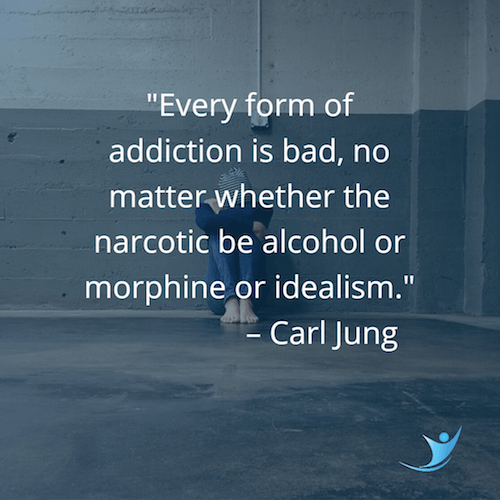The signs of drug addiction aren't as obvious as most people think; millions of people around the world struggle with addiction while hiding it from their friends, family and coworkers.
Do you suspect someone you know has a drug addiction? Maybe it's your best friend, your spouse, or even your parent. Or maybe you're worried that you have a problem.
Often times, people who start using drugs recreationally discover that they want to use them even when they aren't with friends, at a party, or have any real reason to take them.
Whoever you're here for, know that understanding
the signs of drug addiction is the first step toward getting better. The next thing is a few
symptoms but that's another time.

Below are the basic signs of drug addiction, but there are different signs of drug addiction depending on the drug.
First, let's explore the most
common signs of drug addiction. Then, we'll take a look at specific drugs and their addiction symptoms.
Drug Abuse vs. Addiction
It's important to know that drug abuse and drug addiction
aren't the same thing. Drug abuse refers to the use of any illegal drugs. Drug abuse can lead to drug addiction, but abusing drugs does not mean someone is addicted to them.
Addiction occurs once someone develops a tolerance and becomes dependent on drugs.
Drug Addiction Symptoms
When someone uses drugs once and a while their personality probably won't change much. People who take drugs recreationally usually have no problem balancing their drug use with their responsibilities.
But using drugs "just for fun" never stays that way. If anyone uses drugs repeatedly they will eventually develop a dependency, which is what we all know as an addiction.
They Gave Up Things They Used to Like
People who are addicted to drugs have a hard time focusing on anything other than their high. Being high becomes their favourite activity, which means other hobbies they used to enjoy no longer matter.
The common example of a high school star football player who becomes nothing but a couch-ridden druggie is actually pretty close to the truth. People who loved sports, the outdoors, writing, or anything else will suddenly put off all these things.
They may tell you there are other reasons they don't have time for their old hobbies. Don't be fooled; if they're using drugs in place of anything else they most likely have an addiction.
They've Built Up a Tolerance
You may not know how much someone could take before, but if you notice that someone can take drugs regularly without any effect then they may have a problem.
What Does Drug Tolerance Mean?
Drug tolerance means that a person needs more of a drug to feel the same high as the first time.
The increase in drugs is especially harmful to the body. The more drugs you put in your system, the greater the risk of overdosing.
They are Worse Without Drugs
When someone with an addiction doesn't take drugs, they may start to have what are called "withdrawal symptoms." This can include mood swings, nausea, shaking, and depression.
Many drug addicts who want to get sober will continue to abuse drugs just to avoid withdrawal symptoms.
They Look Different
Drug addiction changes a person's appearance. Bloodshot eyes and shakiness are common side effects of drug abuse. Others such as weight loss and bad breath come from a lack of self-care and personal hygiene.
As addiction grows, drugs become the most important part of a person. They'll sacrifice their happiness, relationships, mental wellbeing, and health for a fix.
They Steal or Borrow Money
Addiction isn't cheap;
cocaine addicts in Canada can spend up to $1,200 a day just to stay high.
It's not uncommon for people to borrow money from friends or family, steal, or even pawn off their things just to buy drugs.
Signs of Drug Addiction in Men
Drugs affect everyone differently. Men are
more likely to become drug addicts than women, according to a 2014 study by the
Substance Abuse and Mental Health Services Administration.
While the signs of drug use in men may be similar to general drug abuse symptoms, there are certain signs of drug use in men to watch out for like:
- Increased aggression or irritability.
- More involvement in criminal activity.
- Sudden change in friends.
- Personality changes.
- Depression.
- Unexplained money problems.
Although men are more likely to become drug addicts, women are twice as likely to experience depression and other mental disorders because of drug abuse according to the
National Alliance on Mental Illness.
Signs of Cocaine Abuse and Addiction
We've gone over the signs of drug use in men and drug addiction in general, but now we'll look at some of the addiction symptoms of specific drugs.
Cocaine is one of the most popular drugs among addicts.
Signs of cocaine use and addiction will differ among users, but here are some distinct ones to look out for:
Physical Signs of Cocaine Abuse and Addiction
- Dilated pupils.
- Runny nose and nosebleeds.
- Burned lips or fingers.
- Red holes on arms or legs from injections (track marks).
Mental and Emotional Signs of Cocaine Abuse and Addiction
- Euphoria (Incredibly happy without reason).
- Overconfidence.
- Misplaced excitement.
- Paranoia.
- Poor judgement.
- Overconfidence.
- Believing, seeing, and/or hearing things that aren't there (delusions and hallucinations).
As you can see the signs of cocaine abuse and addiction vary. Talking to the person you suspect has a problem is the best way to gauge what they're using and how often. At first, try to keep things casual.
Approaching a drug addict with anger and accusations will only lead to conflict. Wait until you can speak with concern rather than hostility.
Signs of Opioid Addiction
What are Opioids?
Opioids are a class of drugs that depress the body and relieve pain, giving users a relaxed feeling. Common opioids drugs are heroin, OxyContin, Vicodin, Codeine, Fentanyl, Percocet, and Palladon.
Many people become addicted to opioids by accident; they are given strong prescription painkillers after an injury and then become addicted to them over time.
Physical Signs of Opioid Addiction
- Sleepiness.
- Sedated appearance.
- Small pupils.
- Cravings.
- Slurred speech.
- Rash and itchiness.
Mental and Emotional Signs of Opioid Addiction
- Anxiety.
- Confusion.
- Euphoria.
- Difficulty making decisions or planning anything.
- Memory problems.
Signs of Heroin Addiction
Heroin is a powerful, addictive opioid that destroys lives in more ways than one. Families are torn apart, friendships end, and heroin addicts face major struggles in their addiction.
Heroin is made from the common painkiller morphine. A heroin high makes users feel calm and relaxed, but heroin can also cause many negative side effects.
It's usually snorted or injected. When heroin is injected, its effects are more powerful and happen much faster. Someone who injects heroin will feel its effects in 45 seconds to one minute.
Physical Signs of Heroin Addiction
- Drowsiness.
- Nausea and vomiting.
- Small pupils.
- Track marks on arms and legs.
- Itching or burning skin.
- Slower breathing.
Mental and Emotional Signs of Heroin Addiction
- Confusion.
- Depression.
- Mood swings.
- Lack of emotion.
- Impulsive behaviours.
- Difficulty learning.
- Memory loss.
Signs of Cannabis Addiction
Cannabis is the plant that produces marijuana. Marijuana, or weed, is smoked in a hand-rolled joint, from a bowl, bong, or glass pipe. It is one of the most controversial drugs on the market since so many people are strong advocates for it and it's even legal in many parts of the United States.
However, marijuana is addictive despite the hordes of proud smokers who swear it isn't.
Smoking one joint is as damaging to your lungs as five cigarettes, according to
a study by the Medical Research Institute of New Zealand.
Marijuana may not seem as habit-forming or dangerous as other drugs, but it can develop into a condition known as marijuana use disorder, which can turn into a cannabis addiction.
Here are some
signs of cannabis addiction ->
Physical Signs of Cannabis Addiction
- Red eyes.
- Slowed speech.
- Uncontrollable and misplaced laughter.
- Increased hunger — "the munchies."
- Impaired coordination.
- Delayed reflexes.
Mental and Emotional Signs of Cannabis Addiction
- Loss of friendships.
- Inability to stop smoking.
- Cravings for marijuana.
- Paranoia.
- Slower thinking.
- Difficulty following conversation.
- Increased sensory perception.
- Impaired memory.
- Loss of sense of identity.
- Schizophrenia-like symptoms.
- Anxiety.
Reach Out and Connect
If you believe that you or someone you love has a drug addiction don't hesitate to get help.
You can talk to friends and family members who you trust, but the most important person is the addict.
People can only beat addiction when they want to; being informed and showing them the effects of their behaviour can help push them toward the desire to stop.
Call us or send us an email; we'll gladly answer any questions you have about drug addiction, symptoms, and treatment and help you figure out the next steps.
 Below are the basic signs of drug addiction, but there are different signs of drug addiction depending on the drug.
First, let's explore the most common signs of drug addiction. Then, we'll take a look at specific drugs and their addiction symptoms.
Below are the basic signs of drug addiction, but there are different signs of drug addiction depending on the drug.
First, let's explore the most common signs of drug addiction. Then, we'll take a look at specific drugs and their addiction symptoms.





